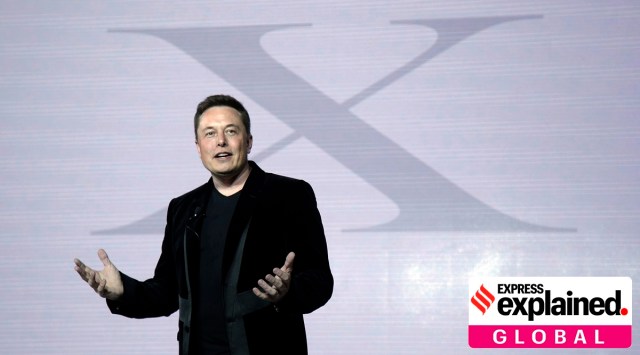Why Elon Musk’s X has sued hate speech watchdog
X said the Center for Countering Digital Hate's claims regarding hate speech on the platform have "encouraged advertisers to pause investment", causing harm to the company’s business.
 Elon Musk, CEO of Tesla Motors Inc., introduces the Model X car at the company's headquarters Tuesday, Sept. 29, 2015, in Fremont, California. (AP Photo/Marcio Jose Sanchez, File)
Elon Musk, CEO of Tesla Motors Inc., introduces the Model X car at the company's headquarters Tuesday, Sept. 29, 2015, in Fremont, California. (AP Photo/Marcio Jose Sanchez, File) Social media platform X, formerly known as Twitter, on Monday (July 31) sued the Center for Countering Digital Hate (CCDH), a nonprofit organisation, whose recent research reports have found an increase in hate speech on the site since Elon Musk bought it in October last year.
The lawsuit has come just days after the social media platform sent a letter to the CCDH, threatening to sue them, a report by Public Broadcasting Service (PBS) said. In response, the CCDH accused X of “intimidating those who have the courage to advocate against incitement, hate speech and harmful content online.”
Why has X sued CCDH?
In a blogpost published on Monday, X informed about the lawsuit against the CCDH, saying that the organisation’s claims regarding hate speech on the platform have “encouraged advertisers to pause investment”, causing harm to the company’s business.
It said: “Despite our continued progress, the Center for Countering Digital Hate (CCDH) and its backers have been actively working to assert false and misleading claims encouraging advertisers to pause investment on the platform.
X is a free public service funded largely by advertisers. Through the CCDH’s scare campaign and its ongoing pressure on brands to prevent the public’s access to free expression, the CCDH is actively working to prevent public dialogue.”
The American National Public Radio (NPR) reported that in its court filing, X accused the CCDH of breach of contract, violation of the Computer Fraud and Abuse Act, intentional interference with contractual relations and inducing breach of contract.
“Twitter is informed and believes, and on that basis alleges, that CCDH is being supported by funding from X Corp.’s commercial competitors, as well as government entities and their affiliates,” the filing said but didn’t provide evidence of this.
How has the CCDH responded?
On Tuesday, the CCDH, in a statement, said Musk’s legal action against the organisation was straight out of the authoritarian playbook. It added: “Musk is trying to ‘shoot the messenger’ who highlights the toxic content on his platform rather than deal with the toxic environment he’s created. CCDH has no intention of stopping our independent research – Musk will not bully us into silence.”
Earlier, responding to the July 20 letter, the organisation had called X’s threat of legal action “ridiculous.” The organisation’s lawyers, in a letter dated July 31, had written: “These allegations not only have no basis in fact (your letter states none), but they represent a disturbing effort to intimidate those who have the courage to advocate against incitement, hate speech and harmful content online”.
What did the CCDH research find?
In recent months, the CCDH has published a host of research papers regarding hate speech on X. The most recent one was published on June 1. It said X fails to take action against 99 per cent of hate posted by Twitter Blue subscribers, “suggesting that the platform is allowing them to break its rules with impunity and is even algorithmically boosting their toxic tweets.”
The report also revealed that no action was taken against tweets containing racist, homophobic, neo-Nazi, antisemitic or conspiracy content posted.
In March, another research by the organisation found that since Musk’s takeover of Twitter, there has been an uptick in the hateful narrative, especially against the LGBTQ+ community, on the platform.
- 01
- 02
- 03
- 04
- 05






































